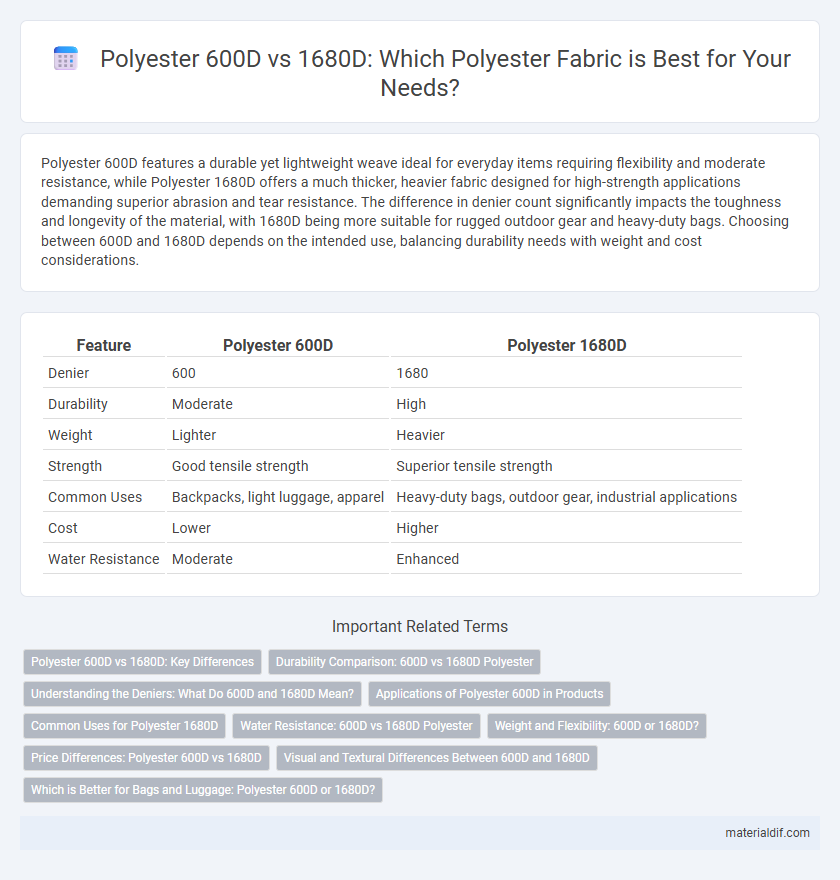Polyester 600D features a durable yet lightweight weave ideal for everyday items requiring flexibility and moderate resistance, while Polyester 1680D offers a much thicker, heavier fabric designed for high-strength applications demanding superior abrasion and tear resistance. The difference in denier count significantly impacts the toughness and longevity of the material, with 1680D being more suitable for rugged outdoor gear and heavy-duty bags. Choosing between 600D and 1680D depends on the intended use, balancing durability needs with weight and cost considerations.
Table of Comparison
| Feature | Polyester 600D | Polyester 1680D |
|---|---|---|
| Denier | 600 | 1680 |
| Durability | Moderate | High |
| Weight | Lighter | Heavier |
| Strength | Good tensile strength | Superior tensile strength |
| Common Uses | Backpacks, light luggage, apparel | Heavy-duty bags, outdoor gear, industrial applications |
| Cost | Lower | Higher |
| Water Resistance | Moderate | Enhanced |
Polyester 600D vs 1680D: Key Differences
Polyester 600D and 1680D differ primarily in their denier count, with 1680D being significantly thicker and more durable than 600D, making it ideal for heavy-duty applications like backpacks and luggage. The higher denier of 1680D provides superior abrasion resistance and strength, while 600D polyester remains lightweight and more flexible, suitable for everyday use and lighter gear. These differences influence the fabric's weight, durability, and cost, guiding the choice based on the required toughness and application.
Durability Comparison: 600D vs 1680D Polyester
Polyester 1680D features a denier rating nearly three times higher than 600D, resulting in significantly greater fiber thickness and enhanced durability. This higher denier count provides superior resistance to abrasion, tearing, and overall wear, making 1680D polyester ideal for heavy-duty applications such as luggage and tactical gear. In contrast, 600D polyester offers a balance of durability and lightweight flexibility, suitable for everyday items like backpacks and outdoor covers where moderate strength is sufficient.
Understanding the Deniers: What Do 600D and 1680D Mean?
600D and 1680D refer to the denier measurement of polyester fabric, indicating the fiber thickness and density, with 1680D being significantly thicker and heavier than 600D. Higher denier polyester, like 1680D, offers greater durability, abrasion resistance, and is commonly used in heavy-duty applications such as backpacks and luggage. Polyester 600D is lighter and more flexible, making it suitable for everyday items like bags and apparel where a balance of strength and weight is desired.
Applications of Polyester 600D in Products
Polyester 600D is widely used in the manufacturing of durable backpacks, tote bags, and laptop sleeves due to its balanced strength and lightweight properties. Its moderate thickness ensures flexibility and resistance to abrasions, making it ideal for outdoor gear and casual everyday products. This versatile fabric also supports water-resistant coatings, enhancing its functionality in rainwear and protective covers.
Common Uses for Polyester 1680D
Polyester 1680D is commonly used in heavy-duty applications such as backpacks, luggage, and outdoor gear due to its superior durability and abrasion resistance compared to 600D polyester. This high-denier fabric withstands harsh conditions, making it ideal for products requiring robust material strength and long-lasting performance. Its thick yarn structure provides enhanced water resistance and tear strength, suited for rugged environments and daily heavy use.
Water Resistance: 600D vs 1680D Polyester
Polyester 1680D offers significantly higher water resistance compared to 600D polyester due to its denser weave and thicker threads, making it more durable against heavy rain and moisture. The tighter structure of 1680D polyester fabric prevents water penetration more effectively, ideal for outdoor gear and heavy-duty applications. In contrast, 600D polyester provides moderate water resistance suitable for everyday use but may require additional waterproof coatings for enhanced protection.
Weight and Flexibility: 600D or 1680D?
Polyester 600D features a lighter weight and greater flexibility compared to the heavier and more rigid Polyester 1680D, making 600D ideal for applications requiring ease of movement and portability. In contrast, 1680D offers enhanced durability and abrasion resistance, suitable for heavy-duty use where sturdiness outweighs flexibility. Choosing between 600D and 1680D depends on prioritizing either lightweight comfort or maximum toughness for specific product needs.
Price Differences: Polyester 600D vs 1680D
Polyester 600D is generally more affordable than Polyester 1680D due to its lower denier, which means less material density and weight. The higher durability and tear resistance of 1680D polyester come at an increased cost, reflecting the premium quality and enhanced performance suitable for heavy-duty applications. Choosing between 600D and 1680D polyester depends on the required balance between budget constraints and the need for superior strength and longevity.
Visual and Textural Differences Between 600D and 1680D
Polyester 600D features a finer weave with lower denier threads, resulting in a smoother texture and lighter visual appearance compared to the heavier, coarser weave of 1680D polyester, which has thicker yarns and a more pronounced texture. The 1680D fabric offers a rugged, matte finish that highlights its durability, whereas 600D polyester presents a slight sheen due to its tighter weave. These textural and visual distinctions influence the tactile feel and aesthetic of products made from each type of fabric, with 600D feeling softer and more flexible, while 1680D feels sturdier and more abrasion-resistant.
Which is Better for Bags and Luggage: Polyester 600D or 1680D?
Polyester 1680D offers superior strength and durability compared to Polyester 600D, making it ideal for heavy-duty bags and luggage that require enhanced resistance to abrasion and tears. The higher denier count in 1680D fabric provides better water resistance and longevity, which is essential for frequent travelers and rugged use. Polyester 600D, while lighter and more affordable, suits everyday bags and lighter carry items but may wear out faster under intense use.
Polyester 600D vs Polyester 1680D Infographic

 materialdif.com
materialdif.com